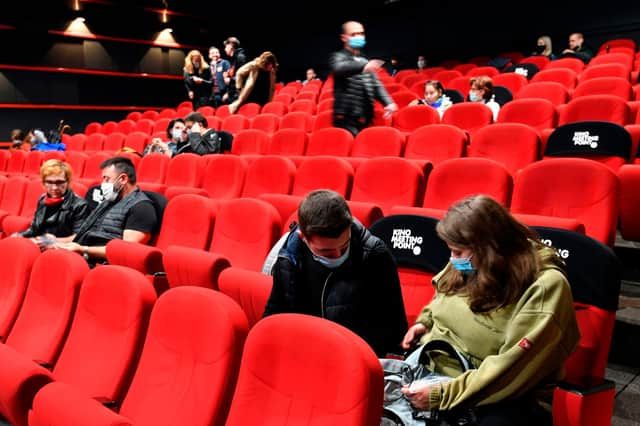Scots may have to wear masks at radically revamped culture and sports events


One of the most senior figures at government agency VisitScotland has predicted it may take up to four years for the sector to return to pre-coronavirus normality.
Director of events Paul Bush has cast doubt on whether any concerts with a capacity over 10,000 could be staged in the near future at arenas like the Hydro in Glasgow or P&J Live in Aberdeen – warning that the return of mass gatherings was likely to be “a challenge” in 2021.
Advertisement
Hide AdAdvertisement
Hide AdBush, who led efforts to bring the MTV Europe Music Awards, the Ryder Cup and the Commonwealth Games to Scotland, said the sector was going to “learn to cope with and manage the virus”.
He predicted event organisers were likely to have to turn to new technology to allow audiences to experience them from their own homes to help them cope with the impact of extra costs to bring in new health measures and curbs on crowd numbers.
Speaking in an online Q&A, Bush said: “The events industry is going to be one of the last to come out of lockdown. While there is no vaccine or treatment for the virus, we are going to have to learn to cope with it and manage it.
“The one thing I’m sure of is that for the next three years the events industry will be very different to what we had a few months ago. Going back there isn’t going to happen for a long, long time. Even for next year, mass gatherings look like a challenge.
“It’s hard to say whether we’re going to be back to events with a 12,000-capacity at the Hydro or the P&J Live arena in the short-medium term.
“We’ve all been advised that outdoor spaces will be more conducive to events than indoors spaces. That means our culture products will have greater challenges than sporting ones.
“A lot depends on what the social distancing advice is. It’s currently two metres. Will that go down to one metre or half a metre? That’ll have a significant impact on how you can or cannot operate an event.”
Advertisement
Hide AdAdvertisement
Hide AdBush said it was currently more crucial for the industry to have a clear and consistent framework for how events could safely go ahead in the near future than a firm reopening timetable.
He added: “One of our key challenges will be building confidence in going back to venues and mass gatherings. We have a collective responsibility as an industry to have continuity and consistency so that people know they will be safe.
“If you go into a supermarket now you have a two-metre queue outside the door, your trolley will probably have been wiped down, the people that take your cash by contactless or card will have a plastic screen in front of them.
“We have to convert that into an event norm for the future. Can we have an events industry with no tickets or no cash changing hands? Is it safe to go to the toilet while you’re at an event? Have they been cleaned regularly? Will people have to wear masks?
“Events will undoubtedly cost more to run. It’s something we’re talking to the government about. We need to get to grips with it in the next few weeks.
“To get a safe passage back into some form of norm there will need to be extra hygiene factors on the ground, whether it is additional cleaners for toilets or whether everybody has to wear a mask.”
Bush said events were likely to have to adapt to having “parallel streams of delivery and income” in future.
Advertisement
Hide AdAdvertisement
Hide AdHe added: “We’re going to have to be clever, smart, innovative. I think you should be able to experience the same event at home, while paying for the privilege. Some events could go to many more markets than they would probably have done before.
“Planning might not sound like the easiest thing to do at the moment. But you’ve got to look into the future and try to imagine what your event will look like.
“The main message I’d give people is that we’ve got to be patient, we’ve got to be optimistic, and we’ve still got to be aspirational and ambitious, as that’s why Scotland has had such a great reputation in the events industry.
“Our events industry is very tough and resilient. The people in it have great fortitude. We will get back to where we were.
“Although we have probably got a long road of recovery ahead of us I have confidence we will bounce back - and hopefully bounce back even stronger because of the innovative ways we present events in the future.”
Comments
Want to join the conversation? Please or to comment on this article.